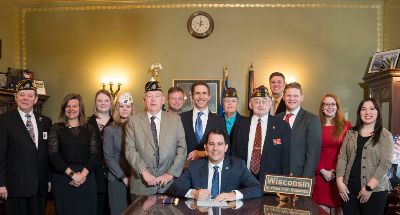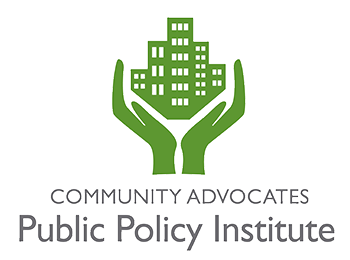In Wisconsin and the United States, we are suffering from uncommonly high long-term unemployment and uncommonly low rates of labor force participation by working-age men.
To help get people back to work, the Community Advocates Public Policy Institute has worked closely with Wisconsin lawmakers from both sides of the aisle to create and sustain Transitional Jobs, an employment strategy that seeks to transition people with labor market barriers into wage-paying jobs that allow low-income, unemployed men and women to do useful work and support themselves and their families. Transitional Jobs—in combination with earning supplements, affordable child care and affordable health care—are key to reducing poverty and increasing employment, as shown by several rigorous analyses by the independent, nonpartisan Urban Institute.
As a local leader on Transitional Jobs, the Public Policy Institute helped to found the Milwaukee Transitional Jobs Collaborative, which seeks to obtain local, state, and federal funding for Transitional Jobs and strives to see that such funding is used effectively. The collaborative includes the Department of Workforce Development, the Archdiocese of Milwaukee, MICAH, and a variety of community-based organizations – please click here to view the full Milwaukee Transitional Jobs Collaborative Membership.
The Public Policy Institute includes staff who previously ran Transitional Jobs programs, experience that helps shape the Institute’s ongoing policy recommendations related to Transitional Jobs.
Our Impact on Legislation
The Public Policy Institute’s work on Transitional Jobs resulted in two significant pieces of legislation:
- In 2009, the Public Policy Institute drafted language for a 2009-11 state budget amendment—inserted into the budget by Sen. Spencer Coggs (D-Milwaukee)—that created the Transitional Jobs Demonstration Project and authorized up to 2,500 jobs slots. Eligible participants in the Transitional Jobs Demonstration Project were between the ages of 18-64 (and parents if between the ages of 21-64); unemployed for over four weeks; ineligible for unemployment insurance benefits and W-2; and had an annual household income of less than 150% of the federal poverty level. Unemployed adults were paid the minimum wage for up to 40 hours of work per week for a maximum of 1,040 hours, or six months.
- The Public Policy Institute subsequently worked with Rep. Tamara Grigsby (D-Milwaukee) to draft the Wisconsin Family Jobs Act, which Gov. Jim Doyle signed into law in May 2010. The Act removed the Demonstration Project’s cap of 2,500 jobs.
Wisconsin and Milwaukee’s Growing Commitment
In July 2010, DCF announced $34 million in federal funding for the Transitional Jobs Demonstration Project, designed to get 4,000 Wisconsin residents back into the workforce. Funding was provided by federal Recovery Act dollars through the Temporary Assistance for Needy Families (TANF) Emergency Fund.
In June 2011, Governor Scott Walker signed the 2011-13 biennial budget into law, allocating million in federal funding for the Transitional Jobs Demonstration Project through the TANF Emergency Fund. The governor’s action extended the Transitional Jobs Demonstration Project -- originally set to expire on June 30, 2012 -- to June 30, 2013.
Two studies of the Wisconsin Transitional Jobs Demonstration Project showed that it was highly effective in enabling a substantial number of unemployed low-income adults to obtain permanent, unsubsidized, employment. Transitional Jobs have also proven to be a valuable tool in helping small for-profit employers to create new unsubsidized jobs.

Influenced by these positive results, in June 2013, Governor Walker signed the 2013-15 biennial budget provision that allocated .75 million in federal funding for Transitional Jobs as part of the Transform Milwaukee project. Approximately 1,000 Transitional Jobs have been created, primarily focused on people living in the 30th Street Industrial Corridor in Milwaukee.
In late 2013, Governor Walker signed into law 2013 Wisconsin Act 113, which expanded transitional jobs beyond Milwaukee. The legislation was championed by Sen. Alberta Darling (R-River Hills) and Rep. Thomas Weatherston (R-Caledonia), and received overwhelming bipartisan majorities in both houses of the Wisconsin Legislature. Funding has not yet materialized to operationalize this expansion. But the current (2015-2017) budget being debated in Madison, in addition to continuing funding for Transitional Jobs in Milwaukee as part of the Transform Milwaukee initiative, would allocate million for expansion of Transitional Jobs to Racine and other Wisconsin communities.
In early 2014 the City of Milwaukee announced that it would become the “host site” for the creation of 100 Transitional Jobs, in two phases, aimed at addressing pressing problems such as filling potholes and getting people with barriers to employment started on a path to work. In the 2015 City budget, the City’s commitment to Transitional Jobs increased to 130 positions.
In April 2018, Governor Walker signed the Hire Heroes Act, which expands Transitional Jobs to all veterans. Authored by state Representative Cody Horlacher (R-Mukwonago) and Representative Daniel Riemer (D-Milwaukee), the legislation passed unanimously in both houses of the legislature. It's modeled on the Milwaukee Transitional Jobs Program and was supported by Community Advocates Public Policy Institute.





